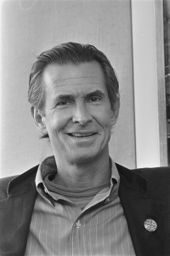Anthony Perkins
Anthony Perkins was a bisexual (probably) American actor best known for portraying the knife wielding psychopath inspired by another probable incelibate: Ed Gein, in the Hitchcock movie: Psycho. In private, Anthony had an extreme fear of women which prevented him from having sexual activity with women making him an incelibate as far as women for at least 20 years of his adult life. He remained a virgin (as far as sex with women) till age 39.[1]
Heterosexual, Bisexual, or Gay?[edit | edit source]
He also is rumored to have had many gay affairs before age 39, including with film star Tab Hunter, dancer Rudolf Nureyev, composer/lyricist Stephen Sondheim and dancer-choreographer Grover Dale[2] leading many to question heterosexuality and even bisexuality, with some thinking he was always gay and never bisexual.[3] It is unknown if Perkins actually had gay sex before 1990ish when he contracted AIDs, but most likely he did.
Fear of Women[edit | edit source]
He described how again and again, when a sexy girl passed him on the street, fear drew a shade over his eyes and he was mentally unable to perceive the girl he was looking at. “I literally couldn’t see a pretty girl,” he says.[4]
A Mother Who Dominated and Sexually Assaulted Him[edit | edit source]
When Anthony was 5 years old, his already distant father died, leaving him with an overbearing mother. He once described his mother as his reason for his fear of women, saying
"She wasn't ill-tempered or mean," he explained, "just strong-willed, dominant....She controlled everything about my life, including my thoughts and feelings. 'What are you reading?' 'Now where are you going?' She felt she was taking responsibility, but she was really taking control."
“She was constantly touching me and caressing me,” says Tony, explaining that her behavior [of erotisizing her son] continued into his adulthood. “Not realizing what effect she was having, she would touch me all over, even stroking the inside of my thighs right up to my crotch.”[5]
He also said[6]
“Because loving my mother was connected in my mind with killing my father, it became dangerous to love my mother.”
Turning down opportunities from Brigitte Bardot, Ingrid Bergman, and Jane Fonda[edit | edit source]
Tony passed up some opportunities for sexual activity with women, due to fear. Once on location in Australia, Ava Gardner asked him up to her hotel room for an intimate supper. “All shook up,” he declined dessert.
In Paris, Brigitte Bardot invited him to her penthouse and made it clear she was ready for action.
“I was like an un-caged leopard,” he says. “Sooner than get close to her I would have crashed through the window and fallen to the pavement 10 stories below.”
Ingrid Bergman also liked Tony.
“She would have welcomed an affair. Every day she invited me to her dressing room to practice a love scene. I insisted on standing near the door, which I kept open.”
Jane Fonda was more direct. Tony says that when they rehearsed in her dressing room, she took off all her clothes and sat suggestively powdering her petal-soft 22-year-old body while Tony hid his face in panic behind his script.
Overcoming fear[edit | edit source]
Anthony eventually overcame his fear of women which was attributed by some to psychotherapy he received tailored to address his neurosis.
For the next nine years Tony saw psychiatrist Mildred Newman four times a week at age 34. One day when she asked him to imagine making love to a woman, tears ran down Tony’s cheeks. “Why are you crying?” she asked.
“I don’t know,” Tony answered. “It’s so sad, so sad.”
He lost his virginity at age 34 to Victoria Principal, co-star of Dallas. After the fourth night of his enounter with Victoria, all his fears of women vanished, he said
“So did a feeling of lethargy that had weighed me down for years. Up to that time, 10 hours of sleep a night had seemed hardly enough. Ever since, seven has been almost too many.”
Death[edit | edit source]
He died September 12th,1992 aged 60 years old of HIV.
References[edit | edit source]
- ↑ https://www.telegraph.co.uk/news/obituaries/culture-obituaries/film-obituaries/5877703/Anthony-Perkins.html
- ↑ Winecoff, Charles (1996). Split Image: The Life of Anthony Perkins. New York: Dutton. ISBN 0-525-94064-2.
- ↑ https://ew.com/article/1996/09/20/split-image-life-anthony-perkins/
- ↑ https://people.com/archive/cover-story-return-of-psycho-vol-19-no-23/
- ↑ https://people.com/archive/cover-story-return-of-psycho-vol-19-no-23/
- ↑ https://people.com/archive/cover-story-return-of-psycho-vol-19-no-23/
